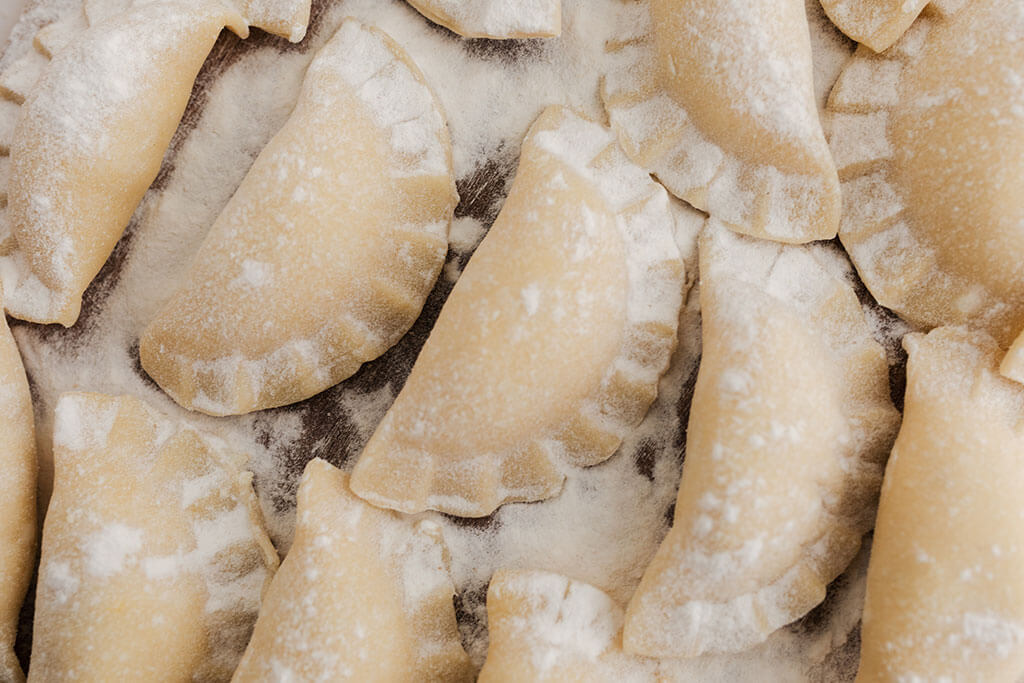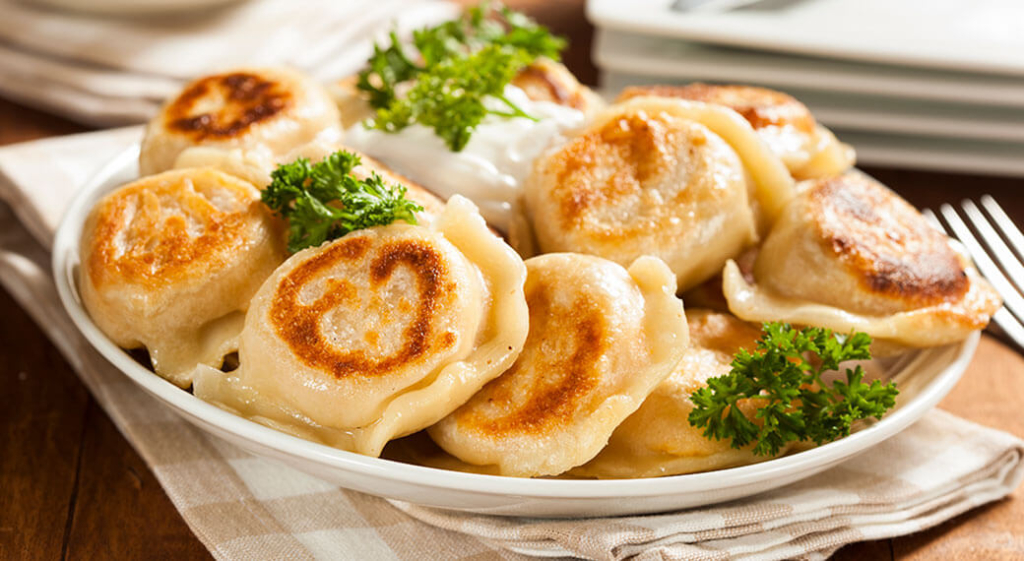Craving a savory wrapped dumpling? Today, we will explore an outstanding comfort food that doubles as the national dish of Poland — pierogi. These boiled, fried, or baked dumplings hail from Eastern Europe, and are now enjoyed throughout the world.
What Are Pierogi?
Pierogi (singular – pieróg) is a generic Polish term for filled dumplings. Most often, they have a savory flavor, but are also prepared with an assortment of fruit filling, especially in the summer.
The ingredients are rather simple; unleavened dough that won’t rise while in the oven and a filling of the chefs choosing. Common types of filling include the following:
- Potato
- Cheese
- Sauerkraut
- Onion
- Mushrooms
- Beef
- Sweet Cheese
- Blueberries

Although some chefs are trying to upward mobilize them in the culinary landscape, they doesn’t have to be complicated or elevated to be delicious. This dish leads a perfect, minimalist existence when skillfully prepared. Who would have thought a dumpling so simple and satisfying could have a contested history?
Fun Fact – Good news for the spelling-challenged, there are many other country-specific names and alternate spelling variants that represent these little dumplings. Here are just a few: periogies, pierogies, perogie, pirogi, pirohy, pyrohy, pyrogy, varenyky, vareniki, and peroge.
St. Hyacinth and His Pierogi!
Like many other dishes, pierogi have a disputed past. Aside from Poland, a great number of countries claim to be part of its origin story including the Ukraine, Lithuania, Russia, Romania, and as far east as China.
Historically, everyone agrees that these dumplings have been eaten and enjoyed since 13th-century Poland. However, the term pierogi first popped up in a Polish cookbook, The Compendium Ferculorum, around the 17th century.
An old-timey saying, “Święty Jacku z pierogami!” (“St. Hyacinth and his pierogi!”) was a Polish call for help in hopeless circumstances. Legend has it that St. Hyacinth created the dish to feed people during a time of famine. There are variations to this story involving St. Hyacinth, but everyone agrees on his title; the Patron Saint of Pierogi. His contribution to the culinary landscape of Poland is still celebrated in modern day life by way of family tradition.
Commercial Soup Equipment Buying Guide »
Pierogi in Poland and Beyond
As their national dish, pierogi evokes a sense of nostalgia and warmth for Poles who grew up associating them with holidays and special events. For instance, handmade pierogi play a part in the Polish Christmas tradition, Wigilia. On Christmas Eve, families celebrate Wigilia, a vigil feast where meat is not allowed. Along with another dozen dishes, Wigilia invariably includes vegetarian pierogi for the family to enjoy before heading to midnight mass.
If you are visiting Poland but can’t make it for the holidays, keep an eye out for pierogarnia (you won’t have to look too hard.) Pierogarnia (singular – pierogarnie) are restaurants that specialize in dozens of pierogi varieties and flavors.
North American Pierogi Enthusiasts
Around the world, pierogi are Poland’s most popular and recognized dish. This comfort food is extremely popular in the United States and Canada as well much in thanks to Polish and Ukrainian immigrants. First, you can find them premade in the freezer section of your grocery store. In the same fashion, another key spot would be food trucks, and local restaurants in Eastern European neighborhoods like those found in Brooklyn’s Greenpoint, the Ukrainian Village in Chicago and many others.
Their popularity is evident through events like Pierogi Fest in Indiana or the statue in Glendon, Alberta. This roadside tribute of the world’s largest pierogi stands 27 feet tall and weighs 6,000 pounds. This Canadian statue is part of the “Giants of the Prairies” sculptures found in Western Canada which includes other larger-than-life statues including the World’s Largest Honeybee, Coke Can, and Mallard Duck.
Are you ready to give pierogi a try? Let us know what you think in the comment section!





I love Pierogies so much, I opened my own small business called Pierogies Please